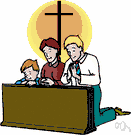Christian religion
Also found in: Thesaurus, Legal, Encyclopedia, Wikipedia.
Related to Christian religion: Hindu Religion
ThesaurusAntonymsRelated WordsSynonymsLegend:
Switch to new thesaurus
| Noun | 1. |  Christian religion - a monotheistic system of beliefs and practices based on the Old Testament and the teachings of Jesus as embodied in the New Testament and emphasizing the role of Jesus as savior Christian religion - a monotheistic system of beliefs and practices based on the Old Testament and the teachings of Jesus as embodied in the New Testament and emphasizing the role of Jesus as saviormortification - (Christianity) the act of mortifying the lusts of the flesh by self-denial and privation (especially by bodily pain or discomfort inflicted on yourself) inerrancy - (Christianity) exemption from error; "biblical inerrancy" errancy - (Christianity) holding views that disagree with accepted doctrine; especially disagreement with papal infallibility; "he denies the errancy of the Catholic Church" Paradise - (Christianity) the abode of righteous souls after death infernal region, nether region, perdition, Inferno, Hell, pit - (Christianity) the abode of Satan and the forces of evil; where sinners suffer eternal punishment; "Hurl'd headlong...To bottomless perdition, there to dwell"- John Milton; "a demon from the depths of the pit"; "Hell is paved with good intentions"-Dr. Johnson faith, religion, religious belief - a strong belief in a supernatural power or powers that control human destiny; "he lost his faith but not his morality" tritheism - (Christianity) the heretical belief that the Father and the Son and the Holy Spirit are three separate gods Adventism, Second Adventism - any Christian religion that believes the second coming of Christ is imminent Catholicism, Catholicity - the beliefs and practices of a Catholic Church Albigensianism, Catharism - a Christian movement considered to be a medieval descendant of Manichaeism in southern France in the 12th and 13th centuries; characterized by dualism (asserted the coexistence of two mutually opposed principles, one good and one evil); was exterminated for heresy during the Inquisition Donatism - a schismatic Christian religion in northern Africa from the 4th to the 7th century; held that only those who led a blameless life belonged in the church or could administer the sacraments Protestantism - the theological system of any of the churches of western Christendom that separated from the Roman Catholic Church during the Reformation Puseyism, Tractarianism - principles of the founders of the Oxford movement as expounded in pamphlets called `Tracts for the Times' article of faith, credendum - (Christianity) any of the sections into which a creed or other statement of doctrine is divided Annunciation - (Christianity) the announcement to the Virgin Mary by the angel Gabriel of the incarnation of Christ ecumenicalism, ecumenicism, ecumenism - (Christianity) the doctrine of the ecumenical movement that promotes cooperation and better understanding among different religious denominations: aimed at universal Christian unity Immaculate Conception of the Virgin Mary, Immaculate Conception - (Christianity) the Roman Catholic dogma that God preserved the Virgin Mary from any stain of original sin from the moment she was conceived Incarnation - (Christianity) the Christian doctrine of the union of God and man in the person of Jesus Christ Nicene Creed - (Christianity) a formal creed summarizing Christian beliefs; first adopted in 325 and later expanded real presence - (Christianity) the Christian doctrine that the body of Christ is actually present in the Eucharist Assumption - (Christianity) the taking up of the body and soul of the Virgin Mary when her earthly life had ended communion - (Christianity) a group of Christians with a common religious faith who practice the same rites council - (Christianity) an assembly of theologians and bishops and other representatives of different churches or dioceses that is convened to regulate matters of discipline or doctrine Church Father, Father of the Church, Father - (Christianity) any of about 70 theologians in the period from the 2nd to the 7th century whose writing established and confirmed official church doctrine; in the Roman Catholic Church some were later declared saints and became Doctor of the Church; the best known Latin Church Fathers are Ambrose, Augustine, Gregory the Great, and Jerome; those who wrote in Greek include Athanasius, Basil, Gregory Nazianzen, and John Chrysostom Antichrist - (Christianity) the adversary of Christ (or Christianity) mentioned in the New Testament; the Antichrist will rule the world until overthrown by the Second Coming of Christ Laurentius, Lawrence, Saint Lawrence, St. Lawrence - Roman martyr; supposedly Lawrence was ordered by the police to give up the church's treasure and when he responded by presenting the poor people of Rome he was roasted to death on a gridiron (died in 258) Ascension, Ascension Day, Ascension of the Lord - (Christianity) celebration of the Ascension of Christ into heaven; observed on the 40th day after Easter August 6, Transfiguration, Transfiguration Day - (Christianity) a church festival held in commemoration of the Transfiguration of Jesus transubstantiate - change (the Eucharist bread and wine) into the body and blood of Christ receive - partake of the Holy Eucharist sacrament assume - take up someone's soul into heaven; "This is the day when May was assumed into heaven" |
Based on WordNet 3.0, Farlex clipart collection. © 2003-2012 Princeton University, Farlex Inc.